The approaching general election for 2025 will be the first in my lifetime in which I am, finally, of the age to vote. After enduring fourteen years of Tory neglect, be it as a trans man, a student, or just as a young adult living amid an entirely preventable cost of living crisis, the idea of—with the aid of the UK’s other voters—enacting powerful, purposeful change with just my vote once greatly impressed me. My old primary school is used as our nearest polling station, and during election days as a kid I would accompany my dad as he went to vote. It was him who instilled in me a deep respect for the democratic process. Yet now, at 22, the spark has faded, if not altogether died. My immediate family have always been staunch Labour voters and for a long while I believed that, when the time comes, I would be voting much the same. But Keir Starmer has made this nigh impossible for me.
When Richard Madeley asked Starmer on Good Morning Britain over a week ago for an update on where he stands on the tired ‘are trans women women’ debate, Starmer answered: ‘I stand with biology’, then apologising in advance to watchers for discussing genitals during breakfast, which is more of an apology than the trans community have ever received from Starmer. His answer, whilst entirely exasperating, nevertheless perfectly conveys to anyone still left guessing the direction he intends on hurtling his party on towards: far, far-right.
Throughout the rest of the interview Starmer continued to throw out more contradictory waffle, mentioning his talks with Brianna Ghey’s mother and the need to respect trans women, whilst in the next breath advocating for ‘biological women’ ‘safe spaces’. Starmer frames Labour’s doubling down on its trans exclusionism as a championing for women’s rights, indicated as much by his supporting of the latest round of bans on trans women participating sports, covered in this PinkNews article.
Susanna Reid seemed determined to wrench an apology out from Starmer on behalf of Rosie Duffield, to which Starmer could only flounder, stating that he does not want for these discussions to slide anymore back into ‘toxic’ places. Maybe he would stand some chance of avoiding this toxicity if he refused to entertain these debates altogether, his willingness to speak on such matters only upping the radiation levels on this cesspool of a discussion topic.
Comments under the YouTube video of the interview vary in tone, from exhausted to bemused to frustrated. One profile-pictureless account asked, ‘is this guy any different from Sunak?’ another account responded, ‘Slightly taller’. Perhaps Starmer would not be so infuriating if he was at least steadfast in his prejudice, if he could at the very least admit that he has no desire to uplift, help or even acknowledge trans identity and experience. It is clear that whatever ‘respect’ Starmer holds for trans women and trans people as a whole, it is as patients, not people. What respect we are doled out is in respect towards our assumed mental anguish, our confusion, our being misled, that we are wrong about ourselves, and the cis population hope we get well soon.
Like a corpse, the colour is draining from Labour with Starmer at the helm, dripping steadily from red, to purple, to blue with each week. I cannot, in good conscience, reveal who I plan to vote for, as right now the act of voting itself seems as ineffective as ever but especially so in regards to the Labour party who, inactive and apathetic, seem more set on my eradication than my protection.
The implementation of the Elections Act 2022 this year means that I am required to bring photo ID with me to the polling station if I am to be issued a ballot paper, a law that pushed me to instead apply for a postal vote for the recent local elections. As someone who has yet to correct my identity on all relevant documents, the idea of presenting my passport to the poll clerks, people who have seen me in public countless times on the street, just to read that infernal ‘F’ under my name and undo all the effort I have put towards reintroducing myself to my community – is appalling. The pledge to self-ID was introduced by Jeremy Corbyn in Labour’s 2019 general election manifesto, only to be dropped by Starmer in 2021. If I am to change my sex on my passport, I am mandated to refer to my gender dysphoria diagnosis, an unnecessary requirement that only forces trans people without a diagnosis to out themselves. The supposed need for all of this was explained last year in a Guardian article by Labour’s Shadow Secretary of State for Women and Equalities, Annalese Dodds, who wrote:
‘It can help refer trans people into the NHS for support services – nearly a quarter of trans people don’t know how to access transition-related healthcare. Requiring a diagnosis upholds legitimacy of applications and confidence in the system.’
This ‘transition-related healthcare’ Dodds writes of is near non-existent for trans people, however, if restrictions like those suggested in the Cass Review are to be followed, restrictions that Labour Shadow Secretary of State for Health and Social Care, Wes Streeting seems intent on applying. What good is this system if all it stands to do is refer trans people to miles-long waitlists and deny them their HRT prescriptions? Dodds also met with trans exclusionary pressure group LGB Alliance on Tuesday for what the group reports as a ‘productive discussion’. It appears that Labour is more determined to court transphobes than advocate for trans citizens, calling into question if Dodds was ever set on helping the community in the first place.
Following the results of the May local elections, Labour now control 71 councils in England, up from their original 57 in 2019, whilst the Conservatives have dwindled from their 2019 original of 89 down to 33. General opinion leads one to think Keir Starmer will win a majority in the next election, once it arrives, but at the great cost of flensing the party of its fundamental leftism. People cling to the conspiracy theory that the policies Starmer is toting are a smokescreen to win over conservatives, and that, magically, the curtain will drop seconds after his stepping over the 10 Downing Street threshold. A frequent defence current Labour supporters use is akin to the mind-numbingly liberal ‘Vote Blue No Matter Who’ slogan of Biden voters during the 2020 US presidential election. The idea that it does not matter who heads the party, only to vote and ensure a Labour government, would make sense if there existed a reason for trans people to vote for Labour at all. In want of becoming electable, they have diluted themselves to the point of limp centrism. Nowadays Labour is a party that is just, to most trans people, Tory by another hue.






